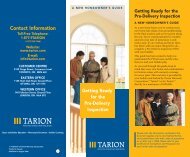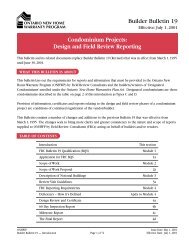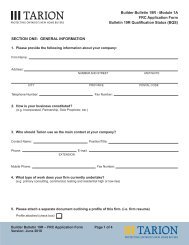Homeowner Information Package - Tarion
Homeowner Information Package - Tarion
Homeowner Information Package - Tarion
Create successful ePaper yourself
Turn your PDF publications into a flip-book with our unique Google optimized e-Paper software.
A GUIDE TO YOUR NEW HOME WARRANTY<br />
Glossary of Terms<br />
Certificate of Completion<br />
and Possession (CCP)<br />
The Certificate of Completion and Possession is a<br />
certificate which specifies the possession date of<br />
your home and which is used to fix the starting<br />
date of the warranties which apply to your home.<br />
The CCP should be given to you by your builder<br />
and should be filled out at the PDI.<br />
Conciliation<br />
A conciliation is a process in which <strong>Tarion</strong> assesses<br />
whether a disputed item is warranted (i.e., covered<br />
by statutory warranty) and/or whether <strong>Tarion</strong><br />
supports the way a repair was done. Where<br />
possible, <strong>Tarion</strong> will base its conciliation decisions<br />
on the Construction Performance Guidelines which<br />
are available on our website at www.tarion.com.<br />
A conciliation may include an inspection at the<br />
home (if items that require repair are involved) or<br />
a desk assessment (if items can be assessed based<br />
on a paper record, e.g., delayed closing/occupancy<br />
compensation claim) and may also include a<br />
review of the purchase agreement, the completed<br />
PDI Form and other relevant documentation.<br />
A Warranty Assessment Report is issued by<br />
<strong>Tarion</strong> following a conciliation. The builder is<br />
expected to fully comply with any direction that<br />
has been provided by <strong>Tarion</strong> in the Warranty<br />
Assessment Report.<br />
Condominium Common Elements<br />
Common elements are areas of a condominium<br />
where ownership is shared among all unit owners,<br />
and they will vary depending on the type of<br />
condominium project, such as townhouse,<br />
high-rise or fully detached. Common elements<br />
include items that are outside the boundaries<br />
of your unit and may include, for example, the<br />
heating system or the windows of your unit.<br />
To determine the boundaries between your unit<br />
and the common elements, you should refer<br />
to “Schedule C” of the declaration of your<br />
condominium, which should be included with<br />
your Disclosure Statement (delivered to you when<br />
you entered into your purchase agreement).<br />
For most condominiums, warranty coverage<br />
also includes the common elements. (There is<br />
no warranty coverage for the common elements<br />
of a Common Elements Condominium, or for<br />
the common elements of Vacant Land<br />
Condominiums.) Coverage for common elements<br />
as well as some spaces that may be for your exclusive<br />
use (known as “exclusive use common elements”)<br />
begins on the day the condominium corporation<br />
is registered. See “Schedule F” of the declaration<br />
of your condominium for details of exclusive use<br />
common elements. Note: This booklet does not<br />
apply to the common elements of a condominium.<br />
Date of Possession<br />
The Date of Possession is the date on which your<br />
builder transfers the right of occupancy to you,<br />
as specified on the Certificate of Completion and<br />
Possession provided to you by your builder. It is<br />
also the date your home’s statutory warranties<br />
begin. For freehold homes, the Date of Possession<br />
can be verified by checking it on your Transfer<br />
Deed of Land or your Statement of Adjustments.<br />
For condominium units, the Date of Possession<br />
can be verified by checking it on your Interim<br />
Occupancy Agreement.<br />
December 24 to January 1 (inclusive)<br />
Holiday Period<br />
In recognition of difficulties which builders may<br />
face in scheduling appointments with homeowners<br />
and/or performing work in the holiday period<br />
between December 24 and January 1 (inclusive)<br />
every year, any time period fixed in the Statutory<br />
Warranty Process will be extended if any portion<br />
of the time period occurs during this holiday<br />
period. Time periods which would span, or would<br />
start or end during this holiday period will be<br />
extended by nine days and all related subsequent<br />
time periods will be adjusted so that they remain<br />
consecutive. For example, a time period which<br />
would otherwise end on December 28 will be<br />
extended to January 6; and a time period which<br />
starts December 15 and would otherwise end on<br />
January 13 will be extended to January 22.<br />
22










